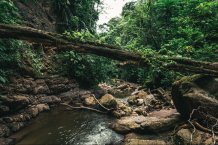
The protection of the Amazon poses challenges for international law
Using human rights laws may be most effective way of harnessing international legislation to protect the Amazon, study shows
Using laws governing human rights may be the best way of harnessing international legislation and tribunals to protect the Amazon, a new study shows.
Safeguarding the rainforest is a critical priority because of the ecosystem’s planetary importance. Recent increases in deforestation and fires in the region have made this even more urgent.
The new research, published in the Review of European, Comparative and International Environmental Law (RECIEL), says using human rights law to protect the Amazon is more likely to have stronger prospects, as campaigners wouldn’t need to submit information about more than one nation for it to be upheld. Courts would only need to judge that environmental damage violated the rights of either certain individuals or tribal and indigenous peoples.
The experts behind the study, Dr Justine Bendel from the University of Exeter and Professor Tim Stephens from the University of Sydney, hope it will be used as a comprehensive guide for those working to protect the Amazon. It assesses the potential for litigation in international courts and tribunals, examining the possible claims, the risks associated with each of these and which are more likely to be successful.
The protection of the Amazon poses particular challenges for international law because global ways of protecting the environment exist alongside the territorial jurisdiction of the Amazon nations, which have permanent sovereignty over natural resources.
The hurdles in jurisdiction and evidence often prevent a clear‐cut judgment and Amazon states from being compelled to take the urgent and direct measures needed to bring the ecosystem back from the brink.
A number of global legal frameworks have been invoked to advance Amazon conservation. These range from the Convention on Biological Diversity (CBD) to the more recent Reducing Emissions from Deforestation and Forest Degradation (REDD+) mechanism. The study shows how they have had limited success, and gains are now being lost.
Domestic proceedings are more likely to be perceived as an unwarranted international intervention in a matter primarily of domestic concern. The study argues for close engagement by the international community with Brazil, and the other Amazon States, to implement internationally agreed conservation outcomes.
The rights of those living in the Amazon and in particular of the indigenous communities are protected by the American Convention on Human Rights (ACHR). Under the ACHR cases may be referred to the Inter‐American Court of Human Rights (IACtHR) by the Inter‐American Commission on Human Rights (IAComHR) or by Amazon States, all of which except Guyana and Peru, are parties to the ACHR.
Indigenous communities in South America have used the IACtHR when governments and firms have wanted to gain access to natural resources located on indigenous lands. The study warns this can be a lengthy process, and doesn’t always effectively protect land as implementation of territorial claims often raises complex issues about rights.
Previous cases have established indigenous peoples have a legal right to a healthy environment and food and water. The study shows how this opens up the possibility for reparations for environmental damage independently from ownership of the land.
The IACtHR has recently confirmed large projects such as the construction of substantial infrastructures or energy‐related projects with potential transboundary impacts may be open to challenge through human rights litigation. Such a transboundary element would also potentially allow claims based on climate change, and therefore the deforestation of the Amazon.
Dr Bendel said: “There are multiple opportunities for human rights litigation to take on the issue of deforestation of the Amazon, and the strengthening of both indigenous rights and the right to a healthy environment make cases to combat deforestation more likely to succeed.
“Recent cases show the IACtHR takes indigenous rights seriously, but compliance with decisions depend on political will, which may be lacking in the Amazonian region, in particular in Brazil.
“We hope organisations working to protect the Amazon will be able to use this study when they plan how to use international courts and tribunals. We have shown the options available, and the limitations of using these organisations and how to overcome them.”
Date: 22 February 2021
